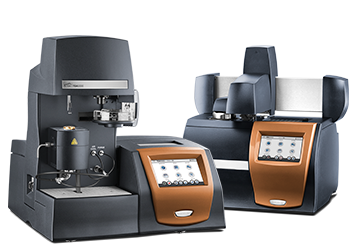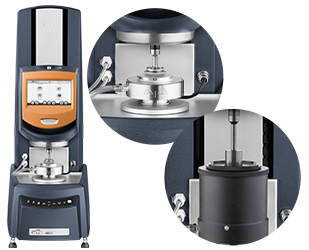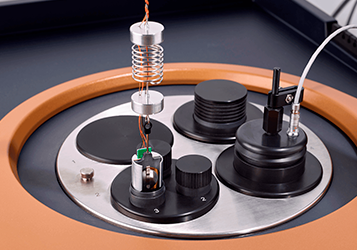Combine Multiple Instruments to Develop More Powerful and Reliable Batteries
TA Instruments | Waters have put together three lab packages designed specifically for your battery lab. Whether you are testing thermal stability to develop safe and efficient batteries, your battery slurry formulation, or whole cell battery testing these instrument packages will complete your lab.
THERMAL STABILITY PACKAGE
Thermal Stability for Safe, Efficient Batteries
One of the most critical parameters in material selection is thermal tolerance. Battery materials must reliably operate under normal environmental conditions, typically between -20 °C to 60 °C, without malfunction or thermal runaway. Battery researchers use thermal analysis to test the thermal tolerance and stability of battery materials and whole cells under realistic application conditions.
Improve battery performance through optimized material selection and processing
Differential Scanning Calorimetry (DSC) aids in material characterization by providing melting and crystallization temperatures critical for proper material development. DSC helps battery labs:
- Process binder materials with sufficient adhesive properties
- Ensure thermal stability in electrolyte freezing for low-temperature performance
- Understand battery degradation and ensure safety
After choosing the right binder and active material, ensure the coating is uniform to support the thermal stability of the battery. Thermogravimetric Analysis (TGA) enables the user to run quality control checks by measuring critical parameters like thermal stability, solvent content, and binder and additive composition. Quantifying these qualities helps streamline the manufacturing process, reducing errors and costs.

BATTERY SLURRY PACKAGE
Slurry Testing for Efficient Manufacturing and Improved Performance
In the race to develop and manufacture high-performance batteries, slurry processing is a key step that greatly influences overall outcomes. A slurry’s rheological properties impact electrode quality, which contributes to overall battery energy density, electrochemical performance, and ultimate cost. Rheology provides critical insights into battery slurries at each manufacturing stage including storage, mixing, coating, and drying.
The Discovery Hybrid Rheometer ensures successful electrode production by helping users:
- Ensure a uniform, defect-free coating
- Produce consistent, high-quality electrodes with low scrap rates
- Test liquids, pastes, gels, solids with DMA, and powders – the only rheometer with all in one!
- Evaluate traditional slurries or new dry coatings
- Minimize training with quick automated setups
The typical DHR configuration for battery slurries is the Advanced Peltier Plate with a 40 mm plate geometry or concentric cylinder with a DIN rotor. And the Powder Rheology Accessory is a must-have for any lab working on battery slurries.

WHOLE CELL TESTING PACKAGE
Non-Destructive Whole Cell and Component Testing Package
Developing successful battery technology requires accurate performance predictions and safety assurance. TAM battery calorimeters allow for non-destructive testing of whole battery cells and components under application-specific environmental conditions. Battery cells can be recovered for follow-up analyses, saving time and resources.
TAM calorimeters offer battery users:
- Versatility to handle a wide range of battery sizes, throughputs, and environmental conditions
- Battery component compatibility testing for informed material assessment
- Charge-discharge testing from one software interface
- Test different battery shapes, sizes, and form factors simultaneously under accurate environmental conditions and temperature
- Sensitivity to elucidate the smallest electrochemical reactions that can reduce battery life


